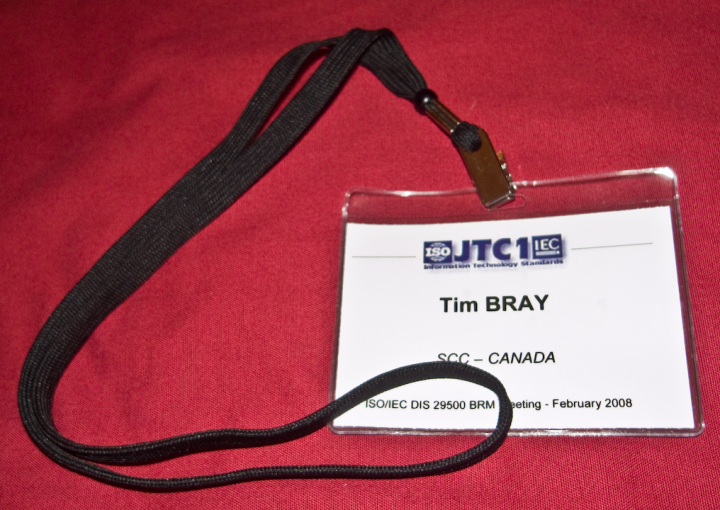
Now that the BRM is over, I feel I can write about it a bit more; there are some restrictions, but I’ll lay them out. Summary: A lot of good work was done, but the process is irretrievably broken.
Boundaries · I’m not going to name any countries or their representatives. That’s sad, because it’ll cost this story some some colour and passion. But it seems to be the price of admission. ¶
History · The OOXML vote was last September, and it failed, but not by much. The countries who voted provided comments; there were thousands, although lots were duplicates of each other. The editorial group who actually produce the spec is referred to as “ECMA”, but in fact the work is mostly done by Microsoft people. They buckled down and sorted the comments into just over a thousand groups. I thought the groupings were sensible. ¶
They accompanied each group with an “ECMA Response”; these became the unit of work at the BRM. I thought the Responses were in most cases quite constructive and intelligent. But in aggregate, they comprised a frighteningly-huge mass of changes to a frighteningly-huge document to be applied in a frighteningly-small amount of time.
The Responses were numbered from one to a thousand and change. They were bundled into a great big 14M PDF and sent to all the countries.
The business of the BRM was to vote on which of these Responses (or variations) should be applied to the draft to produce something that might convince enough countries to change their votes from “No” to “Yes” to make this an International Standard.
What Actually Happened · The “convenor”, Alex Brown, a good guy in a lousy situation, called on the countries in alphabetical round-robin, giving each a chance to talk about a Response (or related group of them), and potentially propose a change to the spec. Of course, nobody’s going to spend time on Responses they’re already happy with, so people focused on where they saw problem areas. ¶
In theory, discussion was only on specific comments and responses. In practice, there was a lot of freedom, because many comments were very general, along the lines of “Spreadsheet formulas are inaccurate” or “Your accessibility framework is inadequate”, so you could propose pretty well anything.
Alex Brown
During the first round, the proposals were a little soft-edged and arm-wavy, but people got savvier as the week went on, bringing forward crisp fully-edited deltas that had been worked through with the Microsoft people and involved multiple nations.
We got through quite a few of these (I didn’t count, but dozens and dozens) and some of them were really big: reorganizing the spec, giving it a better accessibility framework, fixing up i18n bugs, making the “Scope” statements more realistic, cleaning up BCP47 language codes, making the schemas usable. Most proposals, once cleaned up, passed by consensus, a few came to a vote, a few of those lost the vote. Votes were simple majority, one per country, regardless of “O” or “P” membership status.
Of course, most of the thousand Responses didn’t get addressed. And the rules apparently say that if it doesn’t get explicitly voted in, the change doesn’t get made. So there was a gang-vote where everybody could fill in all the Responses they wanted to approve or disapprove, and even put in a default approve/disapprove/abstain clause. This only applied to the Responses that didn’t get dealt with one way or another at the meeting.
Most votes on this were Yes, because whether or not you were 100% satisfied with any given ECMA/Microsoft Response, it was usually an improvement over what had been there before. So almost all the proposals that didn’t get brought up at the meeting passed, which is quite sane behavior. Obviously, we’d have liked to have brought more up for further improvement.
The Result · Well, the version of the proposed ISO/IEC 29500 is somewhat better than the version that got voted down in September. It’s still (speaking only for myself and only about the technical design) not very good, because with the best will in the world, the job was just too big to do in the available time. ¶
What Was Good · The people. With a very few exceptions, everyone really tried hard to work together and make the document better. Everyone freely acknowledged that the job was way too big, but there we were for a week to take a run at it anyhow. I include the nations’ representatives and the ISO people and the Microsoft people when I say this; they were, by and large, a pleasure to work with. ¶
What Was Bad · The process was complete, utter, unadulterated bullshit. I’m not an ISO expert, but whatever their “Fast Track” process was designed for, it sure wasn’t this. You just can’t revise six thousand pages of deeply complex specification-ware in the time that was provided for the process. That’s true whether you’re talking about the months between the vote and when the Responses were available, the weeks between the Responses’ arrival and the BRM, or the hours in the BRM room. ¶
As the time grew short there was some real heartbreak as we ran out of time to take up proposals; some of them, in my opinion, things that would really have helped the quality of the draft.
This was horrible, egregious, process abuse and ISO should hang their heads in shame for allowing it to happen. Their reputation, in my eyes, is in tatters. My opinion of ECMA was already very negative; this hasn’t improved it, and if ISO doesn’t figure out away to detach this toxic leech, this kind of abuse is going to happen again and again.
What’s Next? · The national bodies that voted on the first round have thirty days to decide if they want to change their vote. I totally don’t believe that ECMA/Microsoft is going to be able to pull together a revised draft of this Frankenstein’s monster in that timeframe. That seems like a pretty serious process issue to me, too. ¶
In practice this means that the heavy politics starts Monday morning. National bodies that are smart will make their decision between 8:30 and 9:00 AM on March 3rd and immediately go on long vacations in Tasmania or Nunavut.
Why Me? · I’m knowledgeable about the subject and my country asked me to go. I was not representing anyone or conferring with anyone who wasn’t in the room. This is just me talking. ¶
My thanks to Jean, John, Paul, Phil, and Uma for companionship, support, wisdom, and a whole lot of hard work.


Comment feed for ongoing:
From: Asbjørn Ulsberg (Feb 29 2008, at 15:32)
Thanks for the summary, Tim. It really helps everyone not participating in the BRM, like me, understanding what's going on. I'm glad you're condemning the fast track process. I agree it's completely and utterly broken, at least for a specification of this magnitude.
[link]
From: David Gerard (Feb 29 2008, at 16:58)
So will the ISO Police hunt you down for revealing what happened in the smoke-filled room?
[link]
From: Roland Reddekop (Feb 29 2008, at 17:23)
Thanks Tim for the "flavour". Nice to see a fellow Canadian cracking the door *open* on the *closed* back room process on *open* standards. You seemed to be pretty reasonable in your coverage, but still call a spade a spade. I see the ISO process is like the SMTP e-mail protocol...never designed to handle abuse. They need to reconfigure the process taking into account reality that big business can hijack unguarded processes.
[link]
From: Assaf (Mar 01 2008, at 00:08)
Thanks for explaining what happened without any "we went, we conquered!" spin.
[link]
From: hAl (Mar 01 2008, at 00:45)
A good read.
What would you feel personally was the disposition that was not discussed (only voted upon) but should have been discussed ?
[link]
From: Carolyn (Mar 01 2008, at 01:51)
Tim, acknowledging Roland Reddekop.
>”You seemed to be pretty reasonable in your coverage, but still call a spade a spade.”
Echoe: "You seemed to be pretty reasonable in your coverage, but still call a spade a spade.”
Amen.
A tip of my hat to Canada for a wise choice of representation on this matter.
[link]
From: Andre (Mar 01 2008, at 02:54)
What did other delegates think about the process? Is it true that the Brazilians wanted to axe Alex Brown?
[link]
From: James Justin Harrell (Mar 01 2008, at 09:45)
Why do so many people continue to refer to "ECMA" in all uppercase? The organization changed their name from "European Computer Manufacturers Association" to "Ecma International" in 1994. "Ecma" is not (currently) an acronym, so it shouldn't be in all uppercase.
[link]
From: Serpico (Mar 01 2008, at 16:40)
This is a process which should never have got past step 1:
Question: "Do we need another document format standard?"
Answer: "No. If you have a problem with ODF, then suggest improvements to it."
[link]
From: Luc Bollen (Mar 01 2008, at 18:44)
James, i'm afraid that the fact that Ecma themselves write "ECMA-376" (yes, in uppercase) add to the confusion.
http://www.ecma-international.org/publications/standards/Ecma-376.htm
[link]
From: funnybroad (Mar 02 2008, at 02:28)
"detach this toxic leech"
That is the funniest thing I've read in a long long time!!!
[link]
From: Tony Fisk (Mar 02 2008, at 05:39)
Tim, you do a good job writing dispassionately and fairly about a 'toxic leech'.
The bottom line appears to me that fast-tracking 14M PDF files is an oxymoron.
Having just got back from there myself, I would heartily recommend a trip to Tasmania for delegates who want to make their decisions and lay low: virtually no mobile phone coverage outside Hobart! ;-)
[link]
From: funnybroad (Mar 02 2008, at 13:59)
"detach this toxic leech"
That is the funniest thing I've read in a long long time!!!
[link]
From: len (Mar 02 2008, at 18:23)
That's a good report, Tim. Well said.
Let the shibboleths be heard.
[link]
From: tony (Mar 05 2008, at 09:39)
Thanks very much for your perspective. Many of us (IT) people don't get the inside scoop of these kind of things. I believe you -hit the bullseye- with your report. I agree with the other post about ODF, if there is a problem with it - make additions to it, not re-create the wheel.
[link]
From: Curious_one (Mar 06 2008, at 00:35)
It would, I think, be instructive if one could compare: a) the original language of the specification B) the revised language which was offered for voting and c) the objection(s) raised. This would allow curious people to see if the revised text fully resolved the objections or if they just re-worded the original specification to maintain the lack of full compatibility.
Since it appears that the process has been hijacked by a convicted felon with past documented incidences of using licencing terms as a bludgeon to get their own way, it would be instructive to know why ECMA and the ISO allowed this BRM to be held under these circumstances.
[link]